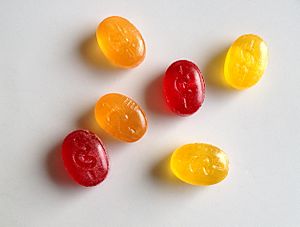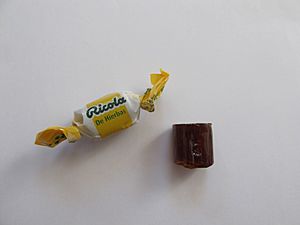Ricola facts for kids
Ricola is a famous Swiss company that makes cough drops, instant tea, and breath mints. Their main office is in Laufen, Switzerland. Ricola sends its products to about 45 countries in Europe, Asia, and North America.
 |
|
| Aktiengesellschaft (AG) | |
| Founded | 1930 |
| Founder | Emil Wilhelm Richterich |
| Headquarters | , |
|
Key people
|
Thomas P. Meier (CEO) |
| Products | Cough drops, breath mints |
| Revenue | 307.2 Million CHF (Swiss francs) (2016) |
|
Number of employees
|
>400 (2016) |
Contents
About Ricola
Ricola is a family-owned business. The Richterich family still owns it, and Felix Richterich is the Chairman of the Board of Directors. The company's daily operations are now managed by people who are not part of the owning family. Thomas P. Meier became the CEO in May 2019.
In 2016, Ricola made about 307.2 million Swiss francs in sales. The company has over 400 employees. Ricola also works with about 200 other companies nearby to help with production.
To get enough herbs for their products, Ricola partners with over 100 independent farms. These farms are located in different parts of Switzerland, like the Valais and Jura Mountains.
Ricola is famous for its fun commercials. These ads often show mountaineers shouting "Ri-co-la!" and playing a large Alphorn.
Ricola's History
Ricola started in 1930. A baker named Emil Wilhelm Richterich bought a small bakery in Laufen. He named his new company Confiseriefabrik Richterich & Co. Laufen. At first, the bakery made sweets like caramel.
In 1940, Emil Richterich began experimenting with herbs. He created Ricola's Swiss Herbal Sweet. This sweet used a special mix of 13 herbs, which is still used today. In the 1950s, people discovered they could dissolve the sweet in hot water to make a tasty herbal tea. This led Richterich to create a Ricola Herbal Tea later on.
In 1967, Emil Richterich and his sons changed the company's name to Ricola. This name is a shorter version of Richterich & Compagnie Laufen. Ricola started selling its products in other countries in the 1970s. They began exporting to places like Japan, Hong Kong, and the United States.
In 1976, Ricola made Switzerland's first sugar-free herbal sweet. In the 1980s, Ricola started advertising on television. This was a time when people cared more about healthy teeth, so sugar-free products became popular. In 1985, Ricola began working with Swiss farmers to grow herbs naturally, following strict organic rules.
In 2006, Ricola opened a new, modern candy factory in Laufen. In 2014, they opened a new production building called the Kräuterzentrum (Herb Center) in the same place. This building is special because it's made of clay and is one of the largest clay buildings in Europe.
More recently, in 2022, Ricola opened its first shop in Paris, France. Customers there can even create their own sweets. In March 2023, they opened a Ricola shop in Laufen, Switzerland.
In 2023, Ricola partnered with IP-SUISSE. This partnership helps grow sugar beets in a sustainable way, without using harmful chemicals. Also in December 2023, Ricola became a B Corporation. This means they meet high standards for social and environmental performance.
Today, Thomas P. Meier is the CEO, and Felix Richterich is the President of the Board. Ricola now exports its products to over 50 countries around the world.
What's in Ricola?
The main ingredient in most Ricola products that helps with coughs is menthol. But a very important part of Ricola products is their special mix of herbs. The classic Ricola blend uses 13 different herbs:
- Elder
- Horehound
- Mallow
- Peppermint
- Sage
- Thyme
- Cowslip
- Burnet
- Yarrow
- Marsh mallow
- Lady's mantle
- Speedwell
- Ripwort plantain
In the United States, the herbal mix is slightly different, with ten herbs. Some of these include linden flowers, wild thyme, and hyssop.
Ricola makes over 60 different kinds of herbal sweets. Some have essential oils, natural flavorings, or vitamin C. All Ricola products are made in Laufen. The company produces about 7 billion candies every year!
You can find many different flavors, like Lemon Balm, Honey Herbs, Orange Mint, and Elderflower. Sugar-free versions are also available. Since early 2022, some products are sweetened with steviol glycosides from the stevia plant. Ricola products are also gluten-free, halal, and kosher.
Ricola makes sure its products are right for each country. For example, some countries have filled sweets. All Ricola products use the special 13-herb mixture. Some products also contain isomalt, which is a sugar substitute.
Ricola Herb Gardens
Ricola has six special display gardens in Switzerland that you can visit. These gardens are open from May to September. Visitors can learn about the original herbal blend and how herbs are grown. The gardens are located in places like Nenzlingen, Klewenalp, and Zermatt.
The herbs used to make Ricola's cough drops are not grown in these display gardens. Instead, they come from natural farms in the Swiss mountains. These farms follow strict organic rules. Ricola makes sure its herb farms are far away from factories or busy roads. This helps keep the herbs clean and free from pollution. Over 100 farms grow herbs for Ricola products. They use an area as big as 124 soccer fields! No pesticides, insecticides, or herbicides are used on these farms.
Ricola Adventure Trail Arosa
In 2021, Ricola opened the Ricola Adventure Trail in Arosa, Switzerland. This trail is about 3 kilometers (1.8 miles) long. It has ten fun stations where visitors can learn about bees, herbs, and how candy is made.
Ricola Advertising
The famous Ricola jingle was first used in 1980 and is still heard today. In some commercials, actors sing the well-known "RIII-CO-LAAAAAAA" sound.
In 1998, Ricola started an advertising campaign with the German slogan Wer hat's erfunden? which means "Who invented it?". These ads were filmed in different countries around the world, like Finland, Australia, and China.
Since 2013, Ricola has used the Swiss-German slogan Chrüterchraft for its international ads. This word means "herbal power." Felix Richterich, the former CEO, explained that Chrüterchraft includes all of Ricola's values: the magical mix of herbs, their Swiss origin, and the good taste of their products.
In 2018, Ricola launched the "Wish you Well" campaign. This was replaced in autumn 2021 by a new campaign called "Just take Ricola." This campaign focuses on the natural alpine herbs, Ricola's Swiss origin, and how the products are both enjoyable and helpful. The advertising campaign also included new packaging and a new logo for Ricola products.
Claims About Ingredients
In 2022, Ricola faced a lawsuit in the US. The person who sued claimed that Ricola's packaging made it seem like Swiss herbs were the only thing that soothed a sore throat. However, the lawsuit argued that menthol was the only ingredient with this effect. Ricola stated that it has always followed all rules correctly.
See also
 In Spanish: Ricola para niños
In Spanish: Ricola para niños
 | William M. Jackson |
 | Juan E. Gilbert |
 | Neil deGrasse Tyson |



